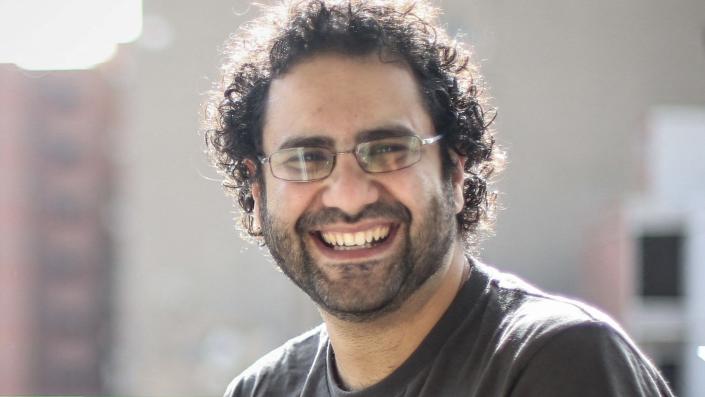
Jailed British-Egyptian activist Alaa Abdel Fattah’s family say his health has “deteriorated severely”, after they were allowed to visit him for the first time since he ended his hunger strike.
“We saw him. He was frail, vulnerable & emotional. All he needed was us around him,” tweeted his sister, Sanaa Seif.
Egypt had denied them access after he stopped drinking water on 6 November.
On Tuesday, the family received a note from him saying that he had broken the hunger strike the previous day.
He did not give a reason his decision, but said he would explain everything during Thursday’s visit to Wadi al-Natroun prison, north-west of Cairo.
Ms Seif said she and her mother, Laila Soueif, had been separated from him by a glass screen and been forced to talk through a telephone “with little space to understand or communicate”.
“We’ll write a detailed statement when we arrive home,” she added.
Abdel Fattah’s other sister Mona Seif, who is in the UK, described the news from the visit as “unsettling”.
News from the visit are unsettling, @alaa deteriorated severely in the past 2 weeks, but atleast they got to see him, and he needed to see the family so much
The family will share the full details later today, please bear with us #SaveAlaa #FreeAlaa— Mona Seif (@Monasosh) November 17, 2022
Abdel Fattah, 40-year-old blogger and pro-democracy activist, is the best known of Egypt’s estimated 60,000 political prisoners.
He is currently serving a five-year sentence for allegedly “spreading false news” – a charge that human rights groups condemned as spurious.
He began a partial hunger strike in April, consuming a maximum of 100 calories a day, to protest against his conditions and Egyptian authorities’ refusal to allow British diplomats to consular access.
His family’s last prison visit was on 24 October, a week before he decided to stop consuming food altogether. On 6 November, he also started refusing water to coincide with the start of the COP27 climate conference in Sharm el-Sheikh, hoping to increase the pressure Egypt’s leaders.
Last Thursday, his mother was told by prison officials that he had undergone an unspecified “medical intervention”. Egypt’s public prosecution meanwhile asserted that he was in “good health”, without providing any proof.
This week, Abdel Fattah’s family received hand-written letters from him, dated Saturday and Monday, saying that he had first resumed drinking water and then ended his hunger strike.
The British embassy has been unable to visit Abdel Fattah to check on his health because Egyptian authorities are continuing to refuse to recognise him as a British citizen – despite UK Prime Minister Rishi Sunak raising his case with President Abdul Fattah al-Sisi at COP27 last week.
Following Thursday’s news from Abdel Fattah’s family, Freshta Sharif of Amnesty International UK said: “It’s distressing to hear this and it’s yet another reminder that UK ministers have got to start taking Alaa’s fate much seriously than they’ve been doing up to now.
“The government can and must secure Alaa’s release and safe return to the UK, and it should conduct an urgent human rights impact assessment of its trade, security and other dealings with Egypt in light of the appalling mistreatment of Alaa and other human rights violations to ensure that no further harm is caused by existing UK-Egyptian agreements.”
Earlier on Thursday, civil society representatives chanted “Free Alaa! Free them all!” at the closing of the COP27 People’s Plenary in Sharm el-Sheikh.




